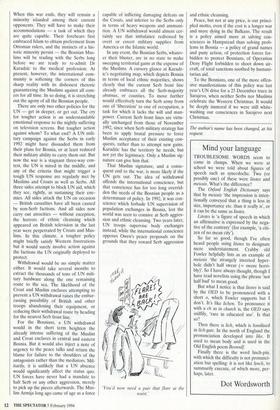Mind your language
TROUBLESOME WORDS seem to come in clumps. When we were at school we were told about figures of speech such as synecdoche. Two (or possibly one) of these were litotes and meiosis. What's the difference?
The Oxford English Dictionary says that by meiosis 'the impression is inten- tionally conveyed that a thing is less in size, importance etc. than it really is', or it can be the same as litotes.
Litotes is 'a figure of speech in which an affirmative is expressed by the nega- tive of the contrary' (for example, 'a citi- zen of no mean city').
So far so good, though I've often heard people using litotes to designate mere understatement. Crabby old Fowler helpfully lists as an example of meiosis 'the strangely inverted hyper- bole didn't half swear (= swore horri- bly)'. So I have always thought, though I have read novelists using the phrase 'not half bad' to mean good.
But what I notice is that litotes is said by the OED to be pronounced with a short o, which Fowler supports but I don't. It's like lichen. To pronounce it with a ch as in church is, the OED says sniffily, 'rare in educated use'. Is that so?
Then there is Lich, which is fossilised in lich-gate. In the north of England the pronunciation developed into like. It used to mean body and is used in the Old English poem Beowulf.
Finally there is the word linch-pin. with which the difficulty is not pronunci- ation but spelling: it is not like lynch, to summarily execute, of which more, per- haps, later.
Dot Wordsworth


















































 Previous page
Previous page